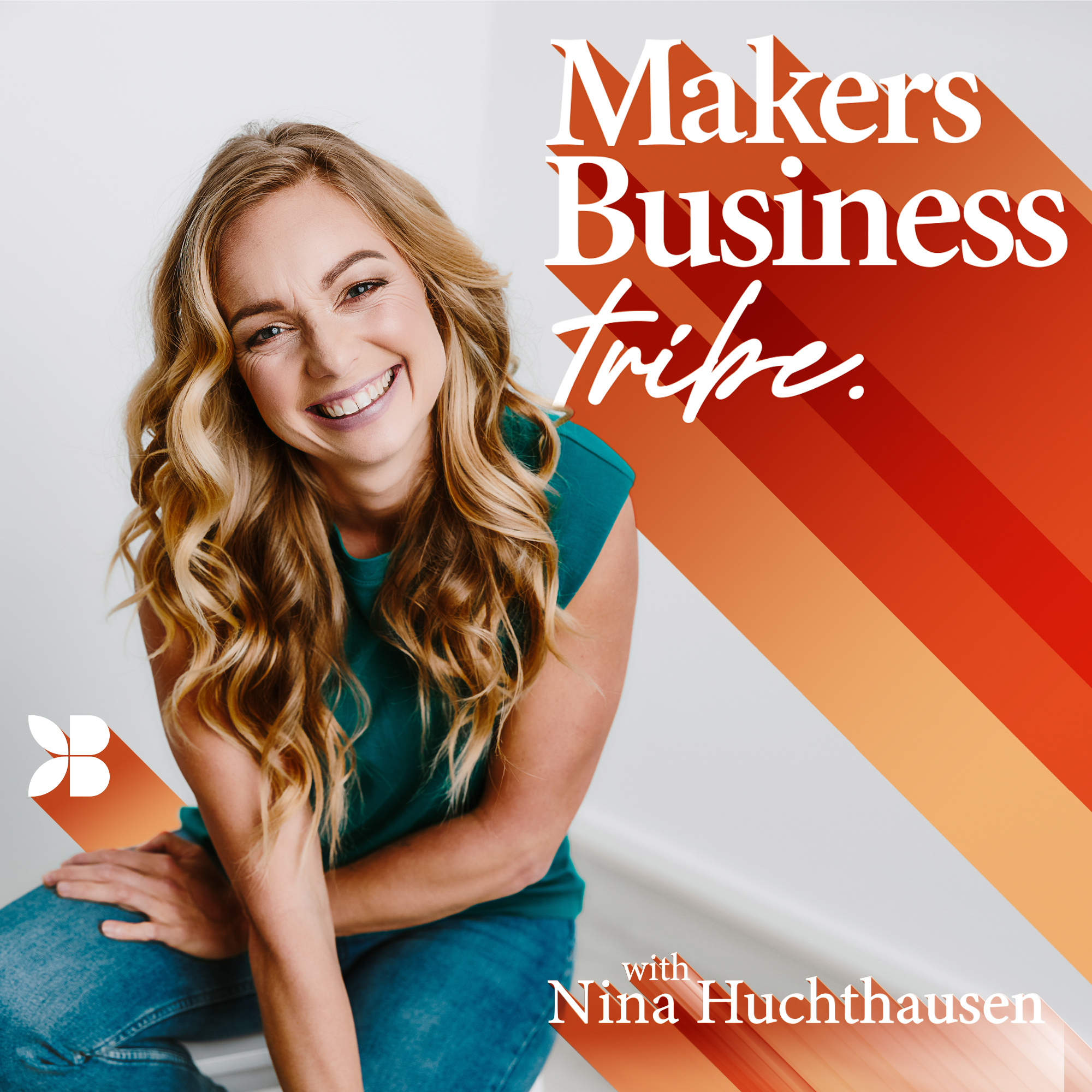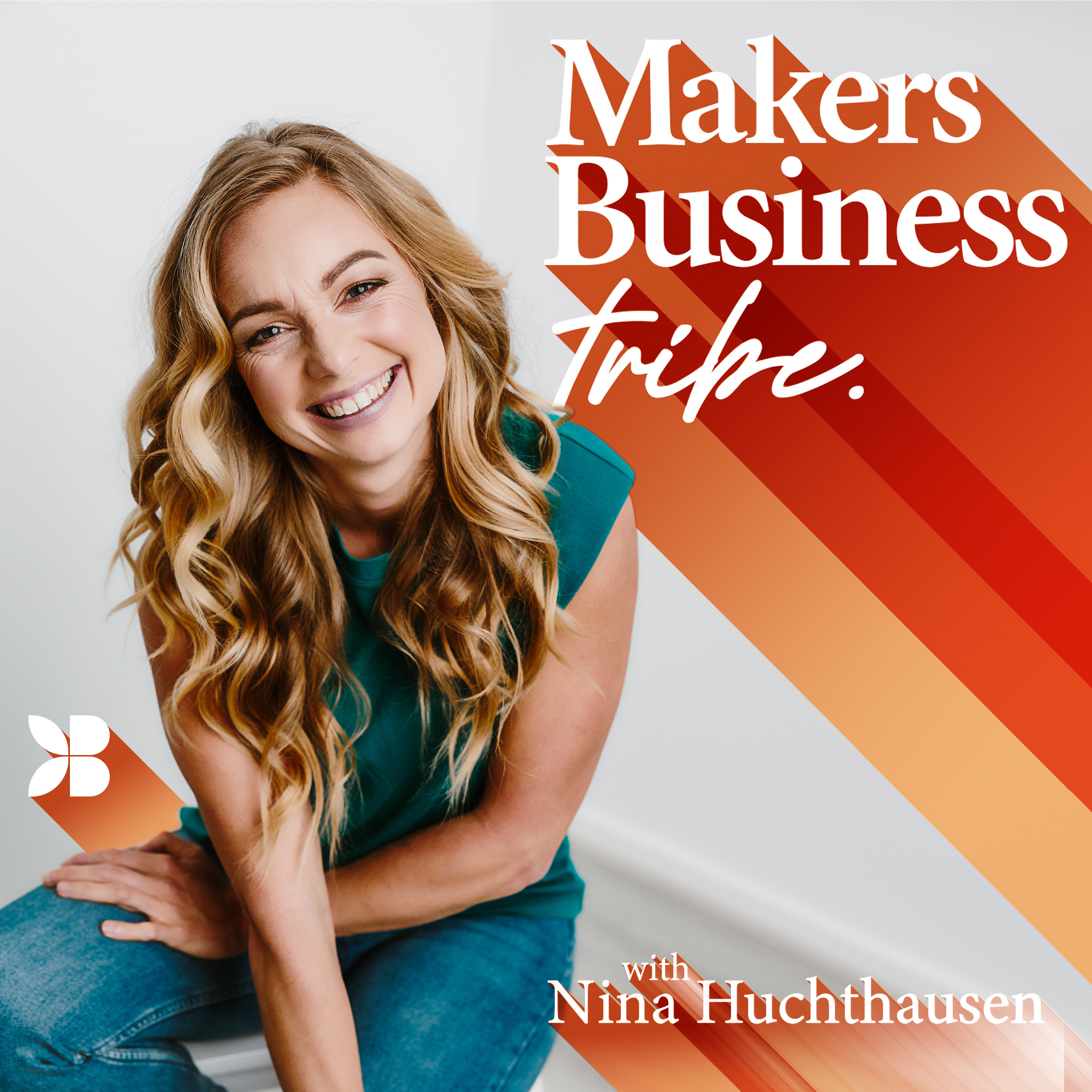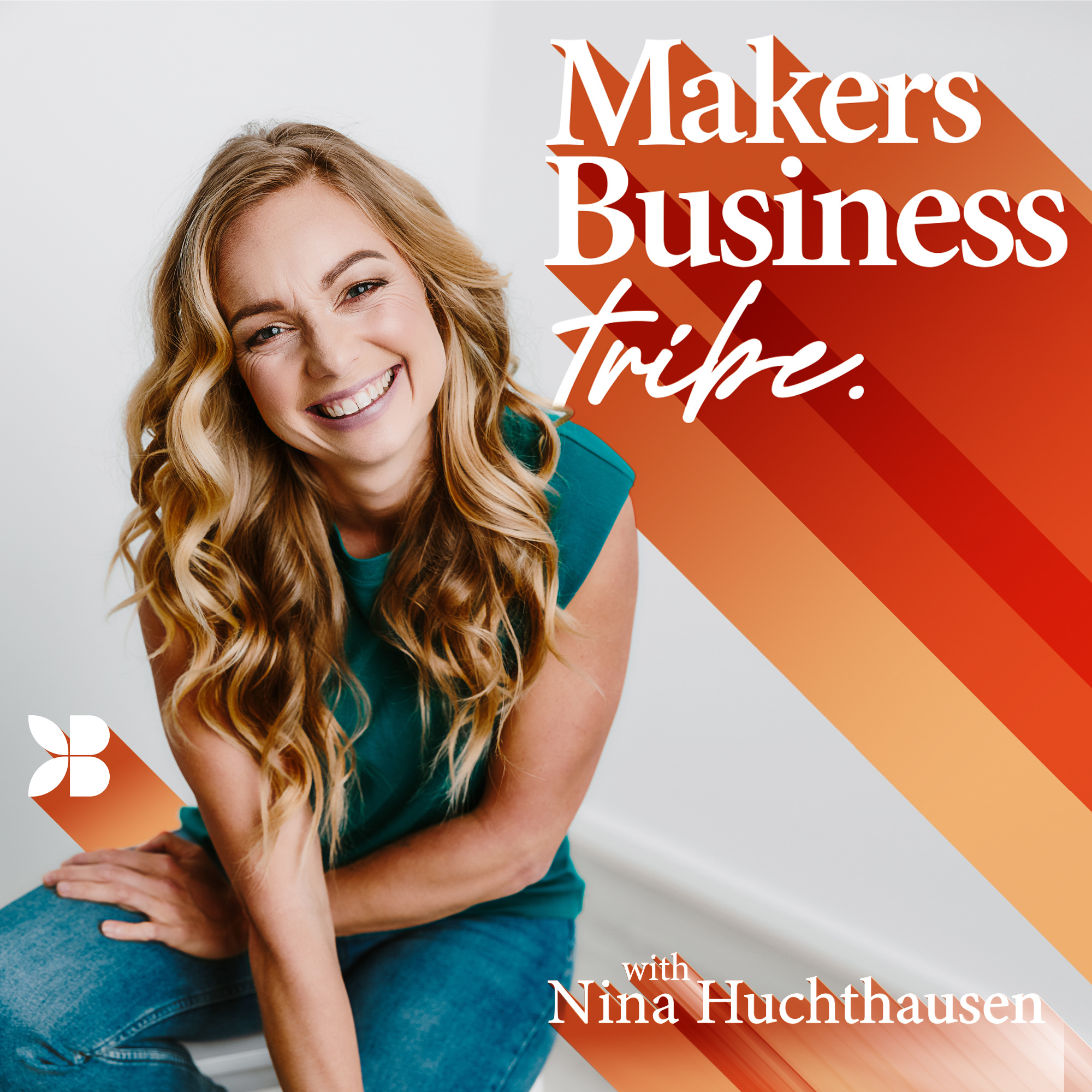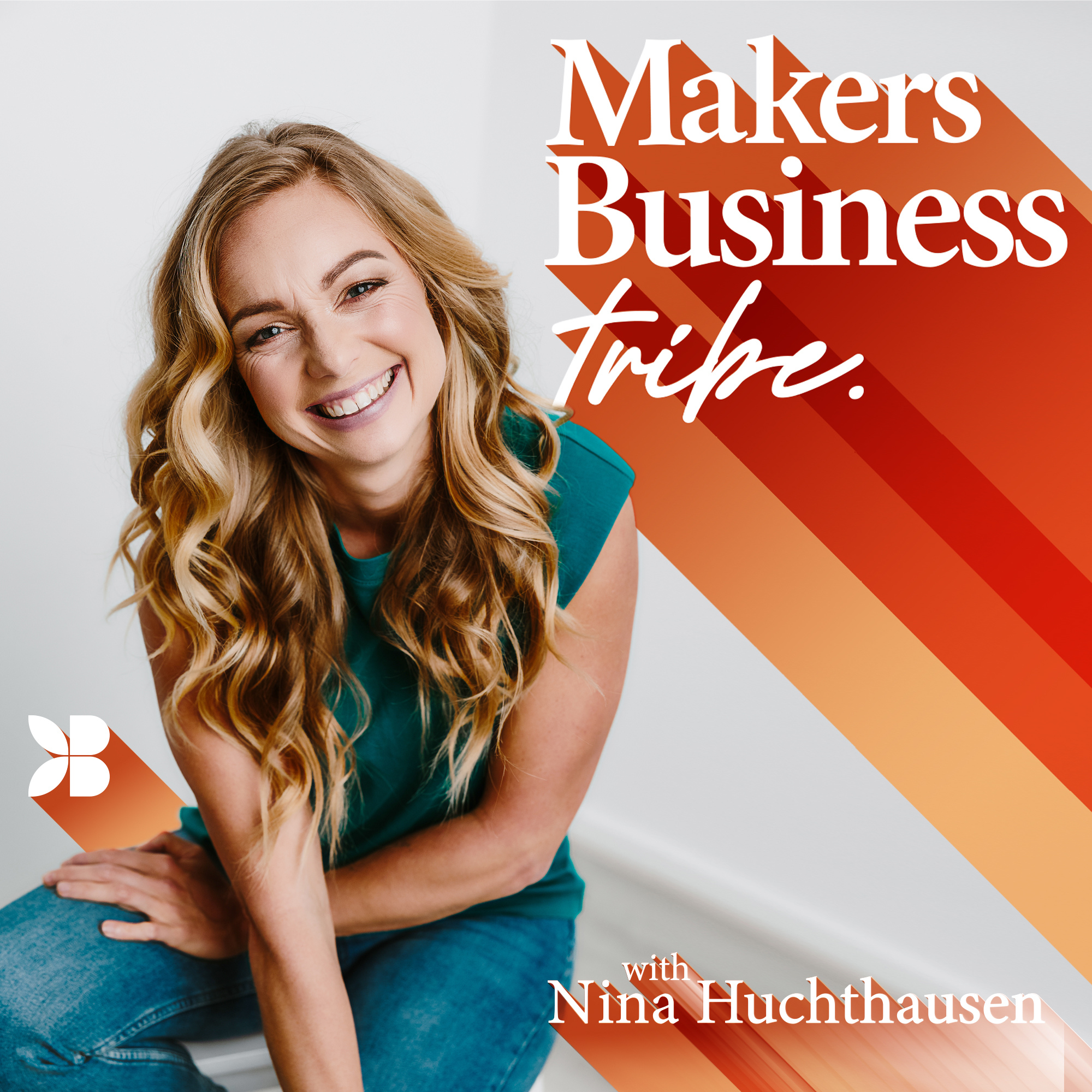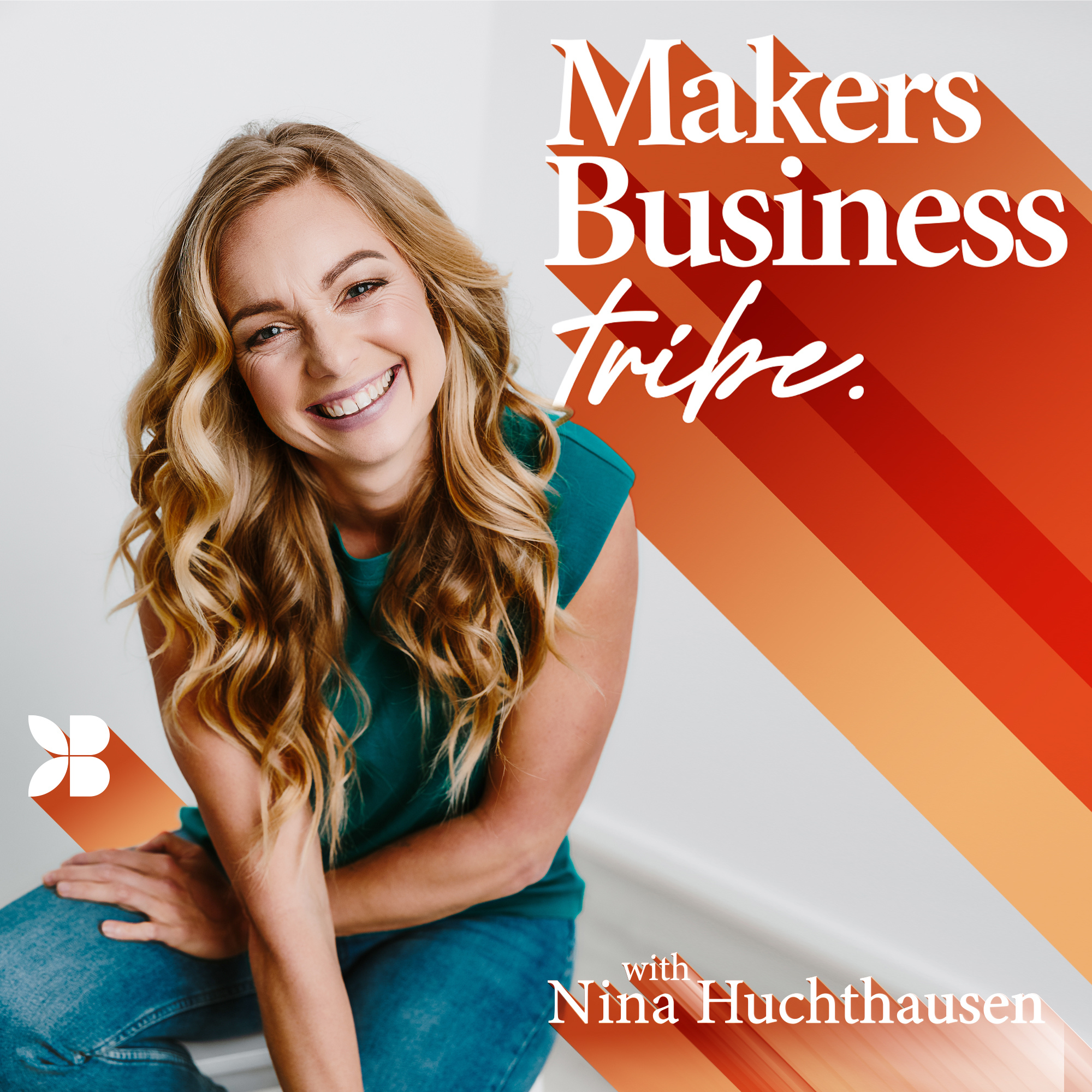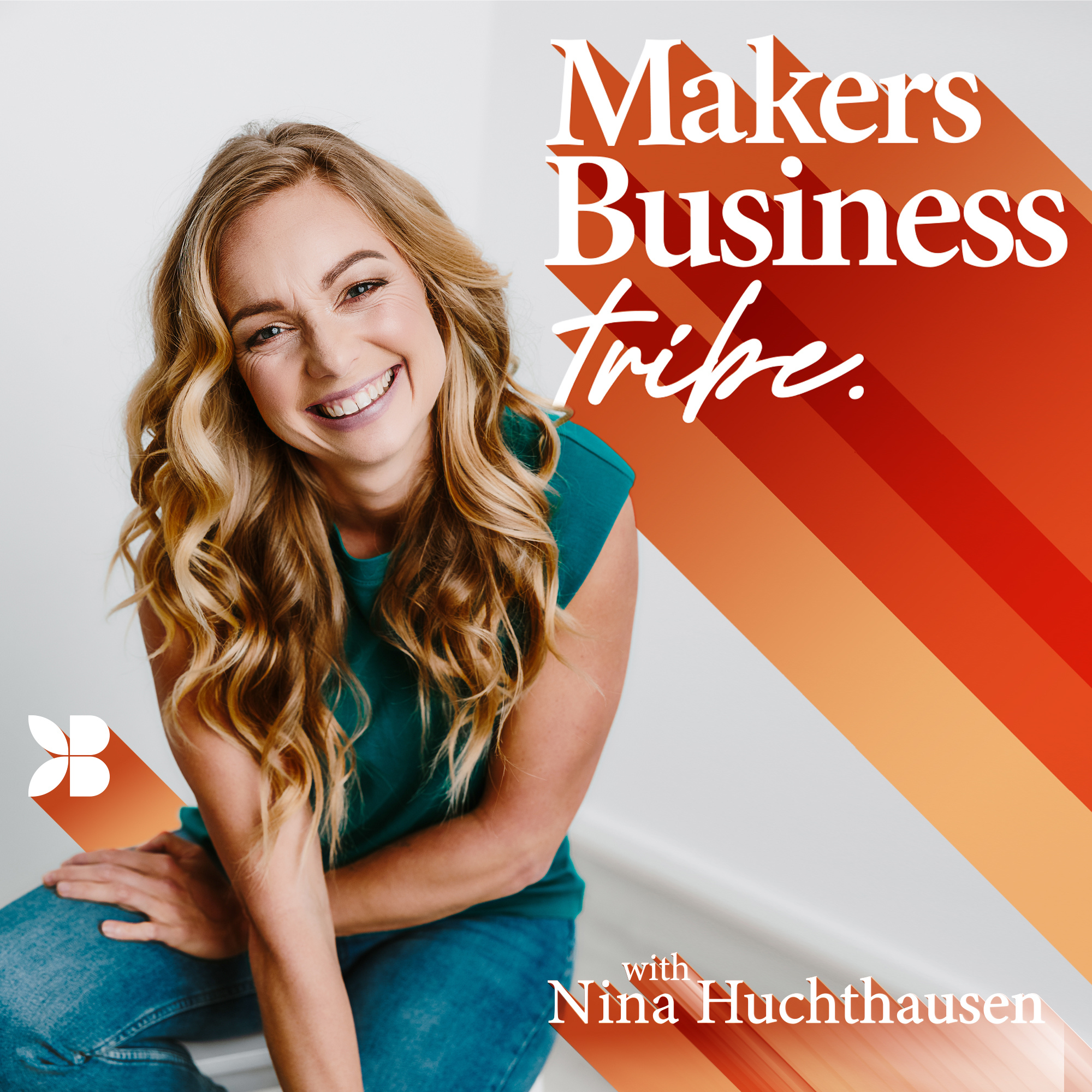Episode Transcript
Nina Huchthausen (00:12.28)
Hello and welcome everyone to the Makers Business Tribe podcast. My name is Nina and I'm your host today. And honestly, think I, if you, I'm really happy that this is a podcast and it is an audio recording because I am traveling right now on the sunny coast and I'm sitting in my room and I'm kneeling on the floor and I got beach hair and
I am excited to have this conversation this week with you about the opportunities that a distributor can create, but I am definitely not set up this week to look good on camera. So apologies, you can imagine a girlfriend with salty hair and slightly sunburned nose, my friends. So yeah, that.
This week, a key topic that has been burning on everybody's chest in the tribe, heaps of conversations that we've had, not just with our tribe members, but also with boutique distributors this week. And that's why for me, it is just so timely because, you know, where energy goes, attention flows. And I truly believe there's so much energy around it.
Additional sales support and getting product out and getting it moving Inside the tribe there must also be that need outside of the tribe because even though you guys are may or may not be tried members You might have a very similar need right now and that is I got product and that product is in my warehouse is
stocked in my house, in my garage, somewhere. you might be super busy working with stockists, getting them on board again, getting them excited about your product, getting them to reorder. But you're like, I need more hands. Ultimately, I need more hands. I need more time. I need to dial up my volume. I need to get my product moving.
Nina Huchthausen (02:39.884)
I want to make a bigger difference. How do I do that? Now, if you have listened to the podcast from two weeks ago, which I had Justin Snyder on from Forest Superfood, if you haven't listened to it, I can highly recommend you go back and listen to it. He was very much talking about that his way of scaling was doing it internally. finding a person
that is dedicated to your brand that you hire, that you're on board, that you pay based salary and commission to help you get your brand out. And that is for certain a really great way to scale your business. But what if you don't have the cash to do that? What if you don't have the capacity or the experience to find
that person to hire that person to onboard that person to train that person and to look after that person and to make sure that they're actually doing a really good job in
sourcing new stockists and having initial conversations, representing your brand well, and then getting the product not just in, but also making sure that they are set up for successful consistent reorders. Because our process isn't easy. And it takes all of our tribe members a while to get their head around, and we do extensive training around this. It's not just a one hour sort of quick thing, but it takes
months and months for a salesperson to get really, really good at their job. And of course, if you were to hire a very experienced salesperson, they come at a price. Yeah. And that can create a fair bit of risk for any business to go down that route. So what could you do instead? What is a way to scale your sales without having to hire if you are not there yet? Or if you don't
Nina Huchthausen (04:52.533)
want to grow your internal team yet for whatever reason that might be. Now, that option is to look at distributors, to look at the distribution route. Is that the silver bullet? Absolutely not. And if you are like me, you might have heard some
pretty bad stories about distributors who have let brands down or who haven't done a good job or who haven't paid their invoice. That's what I hear all the time. Like, I'm not sure if I want to ever work with the distributor because I hear they never pay their invoices. Never, you know, that's probably not the way to go. But it's, it's not an
an uncommon or unheard of scenario, would say. OK, so it's not just a thing of like, OK, I don't have enough time to sell myself. I just get a distributor and I'm done and I'm a millionaire. It's not like that. So let me shed some light on what a distributor can do for your business.
when might be the right time to approach a distributor, what services they may or may not offer or you need to or you can potentially expect and what you need to watch out for before you enter into a distribution relationship. Okay, so if that sounds interesting to you, then keep listening. If you're like Nina, I couldn't care less about this, then...
This is probably not the right podcast. You decide, but for those who are like, damn girl, that sounds interesting. Well, then kick back and let's get started. Okay. So first, first things first, what is a distributor? So a distributor is most of the time a company who offers the service of bringing together under a certain theme.
Nina Huchthausen (07:12.352)
a bunch of different brands so that a stockist can instead of having to deal with all of these brands individually can just go to that one distributor that for example has the theme of just mentioning a good distributor that is unique health products that happens to sell unique health products. The name expresses what these guys do.
So for a stockist, as you can imagine, they are incredibly time poor, right? 90%, 95 % of their time they spend on the floor either unpacking product, stocking shelves, or serving customers. So they do not have much time to deal with potentially 500 different stockists if they stock 500 products individually to keep placing orders.
to keep asking them questions about the products, to keep dealing with refunds, to keep dealing with order delays. That would be an insane amount of time they would have to spend. Just imagine. And just imagine every month they get calls from 500 stockists to ask if they want to do a reorder, if they need sales support, or you name it. So.
From a stocker's perspective, if they already know your product, if they love it, they might be like, man, if I could just like get a bulk order from a distributor and I just call Bob the distributor and I can get 100, 100, 200 different products from one person, man would make my life easier. So from a stocker's perspective, it's
That's a big service that a distributor can provide because, let's face it, it creates a lot of ease for a stockist to do that. Now, what does a distributor do? Like the key job that the distributor is for you as the maker. Well, instead of you going out and getting your product into
Nina Huchthausen (09:36.494)
300 stores that you haven't created a relationship with, that you need to introduce your product to, send samples to, have follow -up conversations, some conversations, get your product in, building the relationship. Ultimately, if a distributor already has the relationships with those 300 stores that you want to get into, they already have a foot in the door.
If they already chat with Mary on a, Mary's a stockist on a regular basis, when they come in next month, it is much easier for them to say, Hey, Mary, I know your store and I know your customers. And I think this awesome new product will sell really well. One of the chances that she just trusts Bob the distributor and say, sounds awesome, Bob, I trust your judgment.
put it on the shelves for me, please. Yeah. Or, okay, cool. Yeah. Let me try it out. Okay. Yep. Sounds good. I'm willing to try. What do you think? Which product should I maybe let go of to get the other one in? Potential. If these guys have a good relationship, that's what it could be like. Is that the case for all distributors? Certainly not. Some, some stock is, some distributors are a lot more transactional.
But that opportunity could be there and I invite you to to entertain that because they already have all those relationships in place. Meaning the trust is there, the connection is there. So and that creates speed. Yeah, because if you can find a distributor that is really, really good at relationship building and maintaining and wanting to introduce new products.
They can do that a lot faster than you could.
Nina Huchthausen (11:37.58)
Now, another key opportunity that this distributor can do is for you is because they are servicing so many different stockers at the same time, they will order in much larger volumes than individual stockers do. So if you are stretched for time and you can send out a whole pallet versus cartons to one person versus to a hundred people, well, that saves you a lot of time.
in terms of shipping, because it's one big shipping versus multiple small orders. And in terms of speed, it's one conversation with Bob and then Bob gets it out for you and his sales team versus you having to build the relationships. And of course, the third opportunity for you is that you don't need to maintain all of those relationships. You don't need to build them.
And you don't need to maintain them because Bob does that service for you. And then the last thing, there are many, many, many, many other opportunities, but if you were to work with Bob, or as I said, you need help, help health products because you have a unique health product. Now I'm not endorsing them in any way. I am just pointing them out because they, they, they do have really good stuff.
on the range.
They don't just have one salesperson in their team. They could have 10, 20, 30, 40 people all across Australia servicing different areas. So meaning if you were to sign up with them, with Bob, with any distributor.
Nina Huchthausen (13:32.93)
you are ultimately getting access to a sales team of name, the number of people that work in the company being on the road versus if you were to hire an internal salesperson, that's one salesperson, right? So you would get access to that opportunity. Now that's what a distributor can provide for you in terms of opportunity.
for your business, right? But is always the right time to approach a distributor? Maybe, maybe not, because what, and here's the key question that we need to really understand first for us to see, am I ready?
to work with the distributor or distributor to successfully work for my brand and create a win -win situation, meaning we are making money and they are making money and everybody's happy and wants to keep working together.
Nina Huchthausen (14:44.77)
This is what we need to get ready for that to occur.
A distributor, as I said before, is a potential sales team, a team of experienced salespeople that already has established relationships with stores.
Now, they have sales skills. They have nurturing skills. They have relationship building skills. But they have no knowledge about your brand, no knowledge about your product, no knowledge whatsoever on how to effectively sell your product. They have no knowledge on how to create really good shelf presentations. They have no knowledge about how to train the staff if your product is not super simple and self -explanatory.
which most products are not. They all have uniqueness to it. And they also have, do not have a tool kit available to market and sell your product. They need to receive that from you.
And for you to do that well, to essentially onboard them onto your brand well, onto your uniqueness, your mission, your values, your product USPs and benefits and payoffs, and to show them how to educate and train staff, to show them how to position and place your product well, to show them what potential point of sales materials are available and how they can use it.
Nina Huchthausen (16:27.874)
for that to happen effectively. You want to have done that work first. You want to have created this. You want to have tested it. You want to be certain that you have a really good toolkit and process in place that you can hand over to them.
If you are just starting off and you are still figuring out what your sales pitch is, what your uniqueness is, what your edge is, who your key customers are, and how you're really positioning your brand as something unique and different that people want, if you haven't fully nailed that, it could potentially be really hard for a distributor to
do a really great sales job because they need this information from you. They, if you can imagine if they have say 20 products in their catalog, they visit a stockist and they have half an hour, which products do you think they're going to talk about and pull out and represent? It will be the products that they are utterly comfortable about.
that they know inside and out, that they love, that they have tested and tried, that they feel like, cool, if this stockist asks me anything and everything about the product, I can answer it. I have a way to explain how unique and different this product is, how amazing the brand is, what makes the brand different. They have a way of emotionally really connecting to it, and they have a way to give the stockist
any tool under the moon to position the product really well and sell it ultimately. Because the relationship that they are building with the stock is like a stockist doesn't want to buy dead ducks. The stockist doesn't want to sit on a product that they can't sell. And if they have a good relationship with the distributor, the distributors, it's also their duty to only sell them products.
Nina Huchthausen (18:43.406)
that the distributors think they can sell because that's what nurtures their ongoing relationship.
So for you, so my recommendation is when is the right time to start approaching a distributor once you have been able to get your products into say 15, 20 stockists. So you have been able to really practice, refine and nail your sales conversation. You have nailed your catalog, your staff education, your self presentations and set up and point of sale materials.
the way you nurture and follow up your offering.
Nina Huchthausen (19:29.108)
and your marketing collateral. Anything that you think, whatever your toolkit might be in order for a distributor to do a great job to sell the product and you can onboard them and you have peace of mind that they can represent your brand well. And they can hand that over to a stockist so they can sell your product well in the absence of you going in doing it yourself.
Because when you hire a distributor, you won't be doing that job anymore. So you need to have a really great way to onboard them effectively. Because if all you do is hand over an amazing product, but they don't know how to sell it, chances are very slim that this relationship is going to be fruitful. OK, so that's the first thing. Now, then when else? What else?
would be a really great idea to have set up. So I would highly recommend that you have your website in place so people can look you up and there's a certain online presence in place that you have had a chance to get your social media going so that there's more and more awareness for people about your brand and your product and that you have an email database. Why? Because every time the distributor onboards a stockist,
You want to still be able to help traffic drive people to that stockist. Whether that's on social media, whether that's on your email database, whether you're mentioning stockists on your website, you want to make sure that you are able to continuously support your stockists by sharing with your customers, hey, go to that store. So having your online presence ready will go a really long way.
then well, you might still be like, but Nina, think I'm, yeah, I, I'm, I'm good now, but what if you want to get into a different region and it's severely costly for you. Say you're in Victoria to keep traveling up to Queensland. If you want to expand into other regions across Australia, but you're one or two main band and you're far away from that region.
Nina Huchthausen (21:54.872)
then just because of that, it might be the right time to think about, well, instead of me hiring someone, could I start working with the distributor and see what job they can do for me?
Yeah. Or when else might be a good time to approach a distributor. When you have, as I mentioned at the start, when you have a lot of stock and you're like, man, it was much better to get that stock out so that I can improve my cashflow and get cash back in. Then having it sit on the shelves and just relying on myself to get that stock moving. Because ultimately.
Even though the margin is much lower than if you were to sell it yourself because you need to sell it, you need to give some margin to the distributor, it will help you over the long run. If you can, especially if you have expiry dates on your product, if you can move that product and make some money, create more brand awareness, get more product onto shelves. And with that, it's ultimately also really helping you when it comes to
advertising because the more people see your products popping up on different shelves wherever they go, the more curious they're going to get. And they might either buy it because of that in store or they start checking you out online. So if you're thinking about just from an awareness creation perspective of your product, if you're like, want to my product to get into the hands of more people, the distributor can help you with that massively.
Yeah. So if that's in need for you, do that. And if you, I'm just playing this further. If you are planning to get your product into bigger stores, right? That are more conservative, that are not just, that are not getting brands out of getting into the shelves that aren't really well known yet. If you want to become more well known faster, the more you can
Nina Huchthausen (24:04.014)
work with different distributors and get it into as many shows as possible. The more you can show the biggest stores that you already stocked in 70 and a hundred and 150 stores, and the more they will start taking you seriously and the easier it is going to be to strike the larger deals. So if that's your aim, distributor could also really help you with that. Okay. Now,
What I haven't shared with you yet, of course, a distributor comes at a cost. But the cost is a margin. The cost is not you paying them a fee most of the time. There might be some distributors who want you to pay a certain fee. Now, most don't, though. Most ask for a certain margin on your product.
Now, what's the advantage, what's the disadvantage of this sort of AEMENT model, if you will?
Nina Huchthausen (25:21.198)
If you are, if you are having, if you do not have a whole bunch of cash to pay an internal salesperson to come in and do the work for you, but you have already invested in your product, right? So you, you have paid for that stock. It sits on your shelves. If it keeps sitting on your shelf, you make $0. If you sell it yourself,
Let's say you make $20 per product, but it's you, your time doing it. Now, if you sold the product to a distributor and the distributor sells it to a stockist, the distributor would take a margin based on your category. It might be different, but let's say it's 35%. Let's say 40%. Depends.
That is their salary. And they know the more they sell, the more profit they're going to make. Now, most, most distributors, they hopefully buy product, pay you an invoice, and then they sell it. Yeah. Or they might negotiate that they have fairly long payment terms, meaning that they're essentially trying to sell the product before they pay you.
but you have no salary outlay here. You'll make less money for the sale of the product, but you don't have any sales outlay. But you do make way more money than having the product to sit on your own shelves and collect dust. Okay? So I hope that answers the question when it comes to paying distributors. And ultimately, the more your product is in circulation and is seen, the more advertising you're going to make.
for yourself and the higher the chances that people are buying it and hopefully not buying it once, but over and over and over again.
Nina Huchthausen (27:28.526)
Okay, so I hope that that gives you a better understanding when it comes to payment. Now, what are the key jobs? What does the distributor actually do? Because here's the thing, the most common objection that I hear from people is like, my gosh, don't like distributors. First of all, I hear they don't pay, they don't pay me, they...
And they might be unreliable when it comes to looking after my stockists or they just ask for crazy margins. Why are they asking for crazy margins? Well, let's imagine the distributors actually doing a really great job and they're super passionate about getting unique health products to as many health conscious stores as possible.
to ultimately make it much easier for you and me to get the best products in the market and to get access to that. Yeah. Let's imagine they really have that passion for it and they have a really great sales culture or culture in itself within the business. And the people that they've hired and onboarded, they're really passionate about doing a great job and giving variety and new brands.
a chance in really wanting to represent all of those new brands well because it excites them.
I invite you to imagine that for a second and to call in these types of distributors to come up for you in your research or when you start having conversations. Let's imagine that and you were to give them 30 or 40 percent or whatever you negotiate with them per sale per product.
Nina Huchthausen (29:27.04)
I would say that could be a really great opportunity for you. Now, but the distributor does more than just selling the product. So here's what they potentially could do for your business. And again, I invite you to not just listen to, what could they do for me? But then also for you to think about, that an opportunity for me? Because maybe
I am not really good at that. I haven't figured that out. I am stretched for time or I would love actually some support in that space. Then again, distributor could offer this for you. So key jobs they might offer for you. They might say, hey, we are happy to store certain amounts of pallets.
and we do warehouse management and picking for you. Picking, packing, getting the product out. So instead of you having the product and you needing to pick and pack and send to a stockist, we do that for you. So the more stockists we onboard, the more we just take that over for you.
They might also say, hey, we're going to organize all the freight for you. Yeah. So if you go with us, national freight, sort it. You do not have to worry about that anymore. Yeah. And we deal with them. If any of the product breaks, if anything is late, that's all taken care of. You don't have to worry about freight anymore. Freight relationships, freight contracts, we do that.
They might actually offer you a national sales field force, meaning not just one or two people, not just within a certain area, but potentially there could be that opportunity that they have people dedicated, experienced, successful salespeople in every single state of Australia and potentially New Zealand or potentially even overseas. My goodness.
Nina Huchthausen (31:43.404)
You could not, if you wanted to, that unless you are already at this potentially seven figure stage. Could be a great opportunity. If we can train them well, if they want to be trained well, and if, that's why I'm saying this right now because this can sound really shiny. If the distributors management practices dictate that
your brand is going to be represented well and promoted by the sales team. If that is not contractually agreed, if that is not what they do, the sales team might be super great. But if their management policy is just focus on selling the products that we have huge amounts in stock from or that we have created
that we have the best margins in, you might lose out and this doesn't help you, in my words, Yeah. So you have to be super certain how do these guys operate and do they have a killer sales team? Because they might say they have a national sales field force, but are they good? How do they operate? What are their procedures? Okay.
They might tell you things that they have an account manager and customer service.
which is awesome, but the question that you want to ask is what does that mean? What specifically do you do? Because, and I'm just playing devil's advocate here. If you pride yourself, having excellent customer service, and when people reach out to you, you respond within four hours.
Nina Huchthausen (33:44.322)
and you are more than happy to pick up the phone and you provide them all the knowledge and tools and support that they need in order to feel fully taken care of. And you hand that over to a distributor who doesn't have the same dedication to customer excellence in place. And all of a sudden, when a stock is reached out, it takes them three days to get back to them. And the answer is more than average.
and the stock is feels really lost and frustrated, then that level of customer service will not help you to establish your brand in a space that you want or in a way that you want to be known for. So it is very important that you get a very clear understanding of what do they mean? What does stand actually behind and sits behind them saying customer service or account management?
And are you happy with that? And going one level further, can you agree and provide to them what good looks like for your brand so that you can objectively agree? Do you want them to take this on or not? Yeah. This is another very key important point that Justin and I spoke about in, in, in, in, in our podcast.
The link is in the show notes, by the way. That customer service can be a key differentiator for you and your brand, not just for the end consumer, but also for stockists. If that's done super well, and no matter how disgruntled the customer is when they reach out to you, when they're always being supported and leave happy, you are winning. So very important.
if for you to really understand to see is this a job that you need support with? Is this a job you want to outsource? And will they live up to your expectations and standards? Okay. Now another job that they might offer to do for you is retail staff education. Hallelujah. If they do that, because this is where we can potentially spend a lot of time doing that.
Nina Huchthausen (36:11.712)
sitting down with retail staff and guiding them through our product or yes, we can provide them with staff education videos and cheat sheets and tool kits and send them samples and all of that stuff. But at the end of the day, we want to keep making sure that everybody is well educated. And sometimes it requires face to face time from you to talk them through or Zoom calls to do that. So it can be a fairly time consuming thing.
So if they can take that over because they keep visiting these stores twice a month anyways, that's excellent. However, we need to make sure that they do this well. Because if they do a shit job and all they do is hand over some, some flies once a month and the staff doesn't know anything about your product is not equipped to sell it and therefore doesn't sell the product.
then that's very unhelpful to you and it could be very damaging to your brand and to your long term success of your product. So very, very important if you have a product that needs staff education to make sure that they are doing that. And we have some brands in our tribe who haven't been able, who haven't been working with a distributor because of that point.
And when they've been calculating the margins that they were losing, still the key work that needs to be done is the education. And that sits on the maker's shoulders. They were like, it's not worth it. So important, really important to think through that point and evaluate the distributor on this point if this is very important to you.
Yeah, same with new product introduction. So let's say you expanding your range. Will they proactively go to the stock and say, hey, brand XYZ, they're having a new balm. And in a month's time, we're going to do an intro sale. Do you want to do a place a pre -order? Do they do something like that? Or do, will they proactively go in and get them excited about new products that you might add to your range?
Nina Huchthausen (38:40.398)
or not. Do you need that? Because maybe you continuously launching new products or new variations and there's continuous work to be done to introduce them to new products, to a new range of your business to make sure that the staff not only knows about the one product, but about the 10, 15, 20, 30 products that you might want to keep launching into the store.
Bye.
Then another thing, another job that they might offer to do for you is taking orders. Yeah. That might sound super simple. And of course, I mean, you sold them the product. They should better just like manage the orders, right? Now, why I'm pointing this out to, to dig a bit deeper into that and make sure that you are happy with the order process is the following. Now you might've seen
very simple and easy ways for people to place orders or for yourself to place an order. Most of the time, online platform or manual, send an email. But you have also seen very clunky and frustrating ways for yourself to place an order. And you're like, man, it's like 15 minutes I'm trying to place an order and then there's this next question or this next thing and the platform isn't working or I'm confused, I'm lost. I would look at that because again,
If you are looking to work with the distributor, you want that process to be easy. You do not ever want a stockist to not place an order with the distributor because the platform sucks and they give up. Yeah. Or the process is just very manual and old school and they don't have a really good way of following up or something, something could go wrong. I would look at that because
Nina Huchthausen (40:38.772)
Again, there is always that, that's what we always associate. If, if, because if your product is good and I want it, but then I'm like having to jump through stupid hurdles with the distributor, I would ask myself as stockist, why did you choose that person to represent you? Now I have a bad taste in my mouth of trying to get your product. I don't have time. You're wasting my time.
Not cool. And that wouldn't be good because you want to stand for, hopefully, premium, high quality, uniqueness, difference, and for people to want to do business with you because you're so amazing to work with. So the tech that the distributor uses is important to check out.
Now, they might also say they do phone sales for you. So instead of going into store, they might also have conversations over the phone. Again, I checked that out. What does that even mean? Do they do a good job? Do they just like call and say, hey, got a new product? Do you want it? But is that actually good? Do you want to give them a margin for that? They might tell you they do sales reporting. That for a lot of people is like, I get a report. Now is that
Report helpful. What does that look like? How is that supporting me? Do I want to pay for that? They might also tell you they do additional trade collateral. Again, what does that look like? Do I have a say? Because it's my brand. It's your brand. Like would they potentially butcher that in any shape or form? Why they do an excellent job because they have awesome designers who do
additional point of sales materials and setups and shelf displays and posters and is that like killer the way they do trade collateral or not.
Nina Huchthausen (42:41.794)
Yeah. And then I'd also tell you, Hey, we do digital marketing. Amazing. Maybe you suck at this, but again, you want to ask, well, what does that mean? Yeah. Does that mean that you're putting some note in email newsletter once a month, or does that mean social media or does that, what does it
What does it really mean? What lays behind that? And does that create value for me and my customers?
Now, there might be a bunch of other jobs that a distributor could share with you or not. we've done recently just reached out to a bunch of distributors again to see what do they offer because there is no law. There is no this is what a distributor offers. Everybody has a slightly different service offering because it's also part of their uniqueness and edge. And some don't really make it very clear of what are you getting.
They will literally just say, we sell your product. Well, my hope is by me just having shared with you the key jobs that they might offer to do for you that you can ask them. Do you do warehousing and picking? Do you support me with freight? Do you have a national sales field force? Or what does your field force look like? How do you train them? How do you measure their success?
Is your management policy when it comes to introducing new products? Yeah. Do I have an account manager? Do you offer customer service? Well, what does that look like? Do you educate retail staff? How does that work? How do you do that? What do you need from me? What does the process look like? Can I vet that process? How do you take online orders? Do you also sell over the phone? What's the percentage face to face with over the phone?
Nina Huchthausen (44:43.938)
sales reporting, trade collateral, digital marketing, do you do any of that stuff? If so, what does that look like? Can you show me the process? Because
Nina Huchthausen (44:56.514)
When you start having conversations with the distributor, it can feel really exciting and shiny if someone says, I want to stock your product.
but it comes at a cost. So you want to make sure that they are creating real value for the margin that you're giving to them.
Nina Huchthausen (45:20.364)
and have a really good understanding about that because you want to create a win -win partnership that makes you super happy to give out that margin because you know they're creating amazing value. And you see that you can clearly see that the margin that you're giving to them.
Nina Huchthausen (45:41.13)
is by far exceeding, is equalizing, or is like.
Frippling 10x in your business and the value that you receive from that Feels very much equal and good to you Okay, because otherwise if they don't do a good job in it stuff education in new product introduction in Representing your product well in
Whatever they do or not do at the end of the day, what it means is you might put your hopes up that they will really help you sell your product, but they could disgruntle stockists by the lack of service, or they might potentially just place one order with you, not sell the stock and the relationship could ultimately die. And that would be a really, really sad outcome.
and probably create a lot of stress and doubt, fear, anxiety, anger, all of those negative emotions for you, which I really do not want for you. So to make sure that if you are ready to scale your business and don't want to hire an internal salesperson, but want to go and distribute around. If that's, if that's what you want to do, make sure that you.
have a really informed conversation about the key jobs that they might offer to you.
Nina Huchthausen (47:29.932)
And yeah, with that, my friends, that's the end of this episode. I hope this was valuable to you, that you feel like time well spent with the conversation that we just had together, that you'll learn a whole heap and that you might get really excited about Googling distributors in your space. It's literally that easy. Jump onto Google, type in your category, type in distributor. Yeah, cosmetics distributor.
health distributor, supplement distributor, and the distributors come up. SEO is really good. And then reach out, introduce your product to them. Make sure you send them some samples because they might say, I'm sorry, but we have enough protein powders. We have enough of this. Make sure they taste it. Yeah. And remember these guys are always open for business. Maybe not in the next 30 days, but maybe in next 60. So make sure you
Line up the product, send them samples, have conversations and for you, even if they tell you maybe Nina in the next quarter we can talk. Awesome. Well, you share with me in the meantime, what are you offering? What's your service offering? I want to get an understanding about you in the meantime, because once you're ready, once you got cash, I want to be the first person you call. Because I feel you can add real value to my business. Yeah.
So when you choose a distributor, it's not just about them choosing you, but also you choosing them. You want to build a partnership, yeah? And you want to make sure that they're the right people for your team. So if they tell you, we can't do it right now, don't take that as a no ever. Take that as an opportunity to assess them properly. I put those, the key points into the show notes.
and get them really excited about your product by making sure they've tried it, they've tested it, and they see real value because cash will always open up. Products might come and go in their category, and as soon as they are ready and you are happy with them, you want them to say yes. All right, my friend, with that, have a wonderful rest of the week. And please make sure if you like this episode, share it with your friends, give it a like.
Nina Huchthausen (49:53.336)
Give us some, share some reviews please on iTunes or Spotify. Bye bye.
